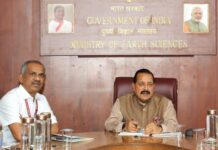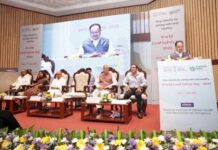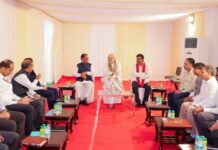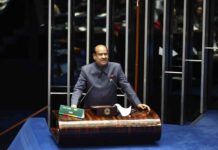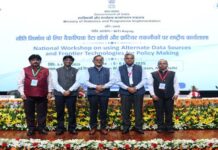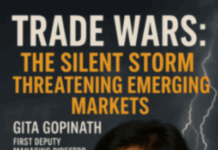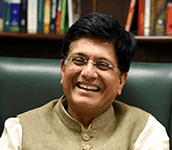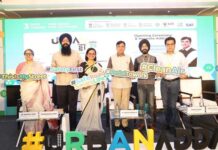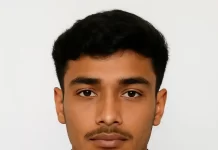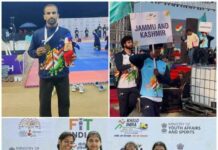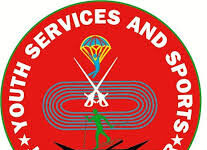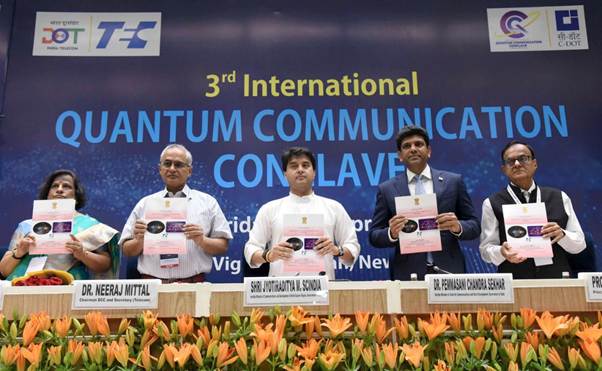APRIL 25: The Telecommunication Engineering Centre (TEC), the technical arm of the Department of Telecommunications (DoT), in collaboration with the Centre for Development of Telematics (C-DOT), hosted the Third International Quantum Communication Conclave today in New Delhi. This high-level gathering brought together national and international experts, researchers, and policymakers to deliberate on the future of quantum communication, with a strong focus on standardization, research, and secure digital transformation.Shri Jyotiraditya M. Scindia, Minister of Communications and Development of North Eastern Region; Dr. Chandra Sekhar Pemmasani, Minister of State for Communications inaugurated the conclave. Professor Ajay Kumar Sood, Principal Scientific advisor; Dr. Neeraj Mittal, Chairman DCC & Secretary (Telecom) and Smt. Tripti Saxena, Sr. DDG & Head, TEC shared the dais.
The conclave was organised as part of India’s definite steps in taking lead in the areas of quantum communication technologies, especially in light of the National Quantum Mission launched in 2023 with an outlay of ₹6003.65 Crore. The mission, a key initiative under the Prime Minister’s Science and Technology Innovation Advisory Council, aims to seed and scale up R&D in quantum technologies while fostering a vibrant and innovative ecosystem across academia, industry, and start-ups.
As part of the event, three significant documents were unveiled to support and promote the deployment of quantum secure technologies: the Standard on Generic Requirements for Quantum Random Number Generators (QRNG), a Technical Report on Migration to Post-Quantum Cryptography (PQC), and a Technical Report on Quantum Secure 5G/ Beyond 5G Core using PQC.
The Standard on QRNG provides a framework that can be used by the organizations for the evaluation of Quantum Random Number Generators. The purpose of Technical Report on Migration to Post-Quantum Cryptography (PQC) is to sensitize the organizations to identify their critical digital infrastructures including data and applications and be ready for a smooth transition to quantum safe cryptography.The Technical Report on Quantum Secure 5G/ Beyond 5G Core using PQC delves into the vulnerabilities of current cryptographic protocols within the evolving 5G core from the emergence of quantum computers and identifies key areas within the 5G Core architecture where post-quantum cryptography (PQC) can be implemented to achieve quantum security.
Delivering the Inaugural Address at the Opening Plenary of the Conclave, Shri Jyotiraditya M. Scindia, Minister of Communications and Development of North Eastern Region, spoke about the revolutionary impact of Quantum Technoloy. He pointed out that “quantum computing isn’t just another step forward, it is a giant leap that will define innovation, accelerate scientific discovery and unlock multiple solutions to human problems that were hitherto always thought of as insurmountable”. Shri Scindia added that “the future now is no longer just digital, the future now is quantum. And the ripple effects of quantum computing are already touching not only scientific discovery but also our lives”. He concluded by saying “let’s step into the quantum age with boldness, brilliance, and a clear sense of purpose.”
Minister Scindia also led the Conclave’s participants to observe one minute silence as a mark of respect to pay homage to those killed in the Terrorist attack in Pahalgam, J & K on April 22, 2025. He condemned the terror attack what he termed as the “cowardly, heinous attack by inhuman elements that claimed innocent lives”. He added, “My heart goes out to all those who have lost their loved ones and each one of us extend our heartiest, from the bottom of our hearts, our deepest condolences to every single family member.”
Dr. Chandra Sekhar Pemmasani, Minister of State for Communications, in his Special Address said that under the transformative leadership of Honerable Prime Minister, India is committed to leading the Quantum technology transformation. He informed that “Through the national quantum mission, we are investing deeply in quantum computing, quantum communications, quantum sensing, and quantum materials. Our vibrant startup ecosystem, our world-class research institutions, and our industry pioneers are already delivering indigenous quantum solutions ready for deployment”. The Minister exhorted all researchers, engineers, and visionary entrepreneurs, to ignite their curiosity, expand horizons, and challenge conventional thought.
The Principal Scientific Adviser to the Government of India , Prof. Ajay Kumar Sood, in his address highlighted that the conclave is taking place in the year 2025 which has been declared as the Year of Quantum by the United Nations General Assembly. Prof. Sood dwelt on the evolution of Quantum Technologies over the last 100 years stating that “today we are in the second revolution of Quantum Mechanics of the newest technology frontier where we now have the tools to controlling the quantum systems.”
Dr. Neeraj Mittal, Chairman DCC & Secretary (Telecom) expressed the hope, “this Quantum Conclave will help us redefine boundaries, foster collaboration—especially since this is an interdisciplinary field—and develop recommendations so that the government is able to take note of them and adapt our policies accordingly.”This conclave aimed to create greater awareness about R&D, standardization and testing of quantum-safe technologies, and promote collaboration among stakeholders.
The technical sessions featured thought-provoking talks and presentations by leading experts and organizations from India and abroad, including Dr. Rajkumar Upadhyay, CEO C-DOT; Dr. Anandaraman Sankaran – Senior Manager, QKD Technical Marketing, Japan; Dr. Ray Harishankar – IBM Quantum Safe, USA; Dr. Kaveh Delfanazari –Senior Lecturer (Electronic & Nanoscale Engineering) University of Glasgow, UK; Mr. Rowan Högman (Advanced technology Director) M/s Ericsson, Sweden; Dr. Urbasi Sinha, Raman Research institute, Bengaluru; Prof. Anil Prabhakar, IIT Madras; and several others.
The conclave also featured exhibition from R&D institutions [C-DOT, CR Rao Advanced Institute of Mathematics, Statistics and Computer Science] and industries/start-ups [QuNu Labs, QpiAI, Qutess Labs & New Age Instruments & Materials Pvt. Ltd.] offering a glimpse into the cutting-edge advancements in quantum communication and related technologies taking place in India.Telecommunication Engineering Centre (TEC), is a standards setting organisation for Telecom and related ICT products under the Department of Telecommunications, Ministry of Communications, Govt. of India. It is responsible for formulation of standards, specifications, test procedures, service specifications and technical regulations for Telecom/ICT sector. TEC is actively involved in the standardisation activities on Quantum Technology at domestic as well as international level participating and contributing to ITU, IEEE, etc. TEC has released standards on “Quantum Key Distribution System” and “Quantum-safe and Classical Cryptographic Systems”. TEC has also constituted a “National Working Group on Quantum Technology” (NWG-QT) with members from academia, industry/startups, R&D organizations, service providers, Govt. Organizations, etc. to have a focused and coordinated approach for development of standards on Quantum Technology.






